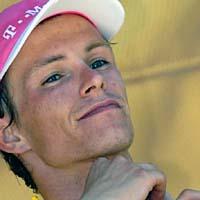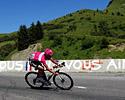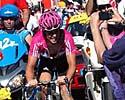
Recently on Cyclingnews.com |
News feature, July 15, 2007
Gerdemann comes out atop on the bottom of La Colombière
By Brecht Decaluwé in Le Grand Bornand, France

|
24 year-old German Linus Gerdemann (T-Mobile) put on a breakout performance in the mountains on Saturday in Stage 7 of the Tour de France; exactly one day before the tenth anniversary of compatriot Jan Ullrich's stunning performance up to Arcalis in stage 10 of the 1997 Tour. Gerdemann won the stage to Le Grand Bornand after boldly attacking his remaining breakaway partners with the last man to succomb to the vicious teutonic attack being Dmitriy Fofonov (Crédit Agricole), some five kilometres from the summit.
There are many positive parallels between Gerdemann and the Jan Ullrich of ten years ago. They both won their first stage in the Tour at a tender age (Gerdemann is 24, Ullrich was 23), they earned the overall lead with their coup and they obviously took over the young rider's classification. And neither one got to wear the white jersey. Ullrich couldn't because the maillot blanc had taken a hiatus at the time and was only brought back in 2000. And Gerdemann will for now wear yellow; the preferred colour for any Tour de France rider.
"I was just looking where the sign was, how long can 500 metre be."-Linus Gerdemann during his last kilometre before the top |
The white jersey may still be an objective later on, as there is no realistic chance for him to carry yellow all the way to Paris, but although he has shown that he has the ability to get through the mountains unscathed, even his young rider's classification ambition may fall victim to his designated workhorse role for team leader Michael Rogers.
But the question that is on everybody's mind in Germany is also if he can do it as a clean rider. The image of professional cycling in Germany has suffered tremendously in the public and in the media with the recent doping confessions by riders like 1996 Tour winner Bjarne Riis, Erik Zabel and Rolf Aldag, to name a few. They were all riding for Telekom, the same team that Gerdemann is riding for, even if it is now called T-Mobile.
A few days ago Gerdemann said that he was sad and frustrated that cycling was having problems just when his career was starting. To give the sport a better image is a daunting task, but Gerdemann thinks that "a lot of things are going in a better way now," he said. "I want to thank the fans, especially those in London but also today, it was unbelievable that so many people were interested in cycling; thank you for believing in the sport when it has many problems," he added.
So will the young German be able to help change the negative image of cycling in his home country and become everybody's darling? At the Tour de France stage seven post-race press conference, he was pragmatic about his place in cycling. "I think in Germany we have many good riders so it's hard to say something like that. I just hope that I can go my way, then we will see. For sure it is my goal to be there, but now I'm just trying to be a good bike rider."

|
Gerdemann didn't want to get ahead of the actual race and himself. For now the undisputed leader is Michael Rogers and Gerdemann will be at his service. "Today is a great day, it's difficult to say more," "Now at 24 I won this Tour award. Next year I want to do well in the GC. For now, this is the biggest day in my career and we will see next year."
The 24 year-old isn't the most well known rider in the Tour de France peloton so he was asked what kind of rider he thinks he is. "I'm doing well on the climbs, it depends on my shape. I think I'm more of a stage race rider; I have to be super fit to be a good climber. The difference with the best GC riders is that they can follow on the climbs if they're not in a good shape. But I think that when I am really good that I am a good climber and time trialist."
The new yellow jersey couldn't tell how his performance would be received in his home country. "It's difficult to say, it's also up to the press now what they will write. We have the clean and clear way with the team. This is a sign that cycling is on the right way. I want to thank the sponsors that they want to support the team in the moment that it's going bad with the sport," he said.

|
In Saturday's stage, the German ace was clearly suffering on the Col de la Colombière, the ultimate and hardest climb of the day. "The point where I saw that I could win was only 300m before the finish because I had cramps in my legs as I had gone over my limits. The last kilometre of the climb was so long. I was waiting for the 500 metre sign, but in the Tour de France there isn't such a sign but I didn't know it," Gerdemann looked back on these hard moments. "I was just looking where it was, how long can 500 metre be," Gerdemann asked himself. "I was so happy when I was on the top, then I had to focus during the downhill. Afterwards I just pedaled as hard as possible. This [win] is beyond my wildest dreams."
For 2007, the T-Mobile team has instituted a much publicized system of internal team medical testing. Gerdemann was asked if he has been tested by his team during this Tour de France already. "Actually we had blood volume tests yesterday," he said. "I wasn't so happy because I wasn't so sure that I would be able to breathe well afterwards. During the Tour de France, we also did it in London. And at the Tour of Switzerland before that. It's not always nice when they knock on the door at 7 in the morning to take blood but we need to do something to show that cycling is possible on a clean way. I want to thank the team that they do things like that so the people can believe in us. I hope the other teams do the same as especially the blood volume test is an important test to see that we're on the right way, the clean way."
